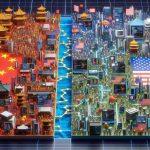A cutting-edge laboratory has been established by the Space Science Department at the Sharjah Academy for Space Science and Technology, affiliated with the University of Sharjah. This new facility aims to pioneer breakthrough scientific research in the realms of artificial intelligence and astronomy.
Space Innovation Hub: A Gateway to the Future
The laboratory is dedicated to revolutionizing the field of artificial intelligence in analyzing astronomical data. This initiative seeks to propel interdisciplinary projects merging computer science and space exploration, fostering collaboration among researchers and students to drive innovation and discovery in the field of space science.
Diverse Scientific Endeavors
In addition to the Artificial Intelligence Lab, the department houses several other scientific laboratories, including the Meteor Center, the CubeSat Lab, the High-Energy Astrophysics Lab, and the Space Weather and Ionosphere Lab. These research facilities contribute to advancing scientific knowledge in space science and astronomy, utilizing artificial intelligence to process vast amounts of astronomical data swiftly and efficiently.
Exploring Cosmic Mysteries
Research initiatives within the lab range from developing deep learning algorithms for asteroid identification to utilizing AI for comet discovery and studying solar explosions through radio astronomy. The Meteor Center boasts a unique collection of over 8000 meteorite samples, offering a distinctive opportunity to delve into the physical and chemical properties shaped during the formation of the solar system.
Empowering Future Innovators
Moreover, the lab focuses on training young talents in designing CubeSats and spearheading community-oriented projects aligning with the UAE’s ambitious space program. Efforts are underway to launch the “Sharjah-Sat” series of CubeSats to enhance satellite-based services and propel the nation’s space endeavors. The collaboration with local entities aims to elevate the Emirates’ projects by providing high-resolution imagery and establishing ground stations to support satellite communication post-launch.
Unveiling Cosmic Dynamics
The High-Energy Astrophysics Lab within the department specializes in studying stellar and galactic systems emitting high-energy radiation. By leveraging satellite data, researchers investigate dense astronomical bodies such as black holes and neutron stars, unraveling insights into their nature and evolution through advanced data analysis tools.
Enhancing Space Weather Awareness
The Space Weather and Ionosphere Lab plays a pivotal role in monitoring the ionospheric layer in the UAE, contributing essential data on space weather conditions. Through various experiments, the lab examines physical processes within the ionospheric envelope, enhancing understanding of the interaction between the ionosphere and Earth’s magnetic field. Studies conducted here broaden the knowledge of ionospheric conditions in the region and assess the susceptibility of space and ground technologies to adverse space weather phenomena.
In conclusion, the innovative research conducted in these cutting-edge laboratories showcases a significant leap forward in space exploration, blending artificial intelligence with astronomy to unveil the mysteries of the cosmos and propel the UAE’s space ambitions to new heights.
Revolutionizing Space Exploration Through Artificial Intelligence: Uncovering New Horizons
As the intersection of artificial intelligence and space exploration continues to evolve, new horizons are being uncovered in our understanding of the cosmos. Beyond the established initiatives in the Space Science Department at the Sharjah Academy for Space Science and Technology, several key questions and challenges emerge as we delve deeper into the realm of revolutionizing space exploration through artificial intelligence.
Key Questions:
1. How can artificial intelligence enhance the efficiency of spacecraft operations and data analysis in space exploration missions?
2. What advancements are being made in using AI to predict and mitigate space weather events that could impact satellite communication and navigation systems?
3. What are the ethical implications of integrating AI into space exploration processes, particularly concerning decision-making and autonomy in spacecraft operations?
Answering the Questions:
1. Artificial intelligence can streamline spacecraft operations by automating tasks, aiding in autonomous navigation, and improving data processing speed onboard spacecraft, enabling quicker decision-making and enhanced mission success rates.
2. AI algorithms can analyze vast amounts of data from space weather monitoring systems to predict solar flares, geomagnetic storms, and other space weather events, allowing for proactive measures to protect satellites and astronauts in space.
3. Ethical considerations in AI for space exploration involve ensuring transparency and accountability in AI systems, addressing biases in data used for decision-making, and defining clear guidelines for AI usage in critical space missions.
Key Challenges and Controversies:
1. Balancing the reliance on AI in space exploration with the need for human control and intervention in unforeseen circumstances.
2. Addressing cybersecurity concerns and vulnerabilities in AI systems used for space missions to protect against potential cyber attacks targeting spacecraft and satellite networks.
3. Navigating international regulations and agreements regarding the use of AI in space exploration to ensure responsible and collaborative utilization of AI technologies across borders.
Advantages and Disadvantages:
Utilizing artificial intelligence in space exploration offers advantages such as enhanced data analysis capabilities, increased mission efficiency, and potential cost savings through automation. However, challenges include the need for robust AI systems that can adapt to dynamic space environments, concerns about AI decision-making in unpredictable scenarios, and the ethical dilemmas associated with AI autonomy in critical space missions.
In navigating these complexities, the fusion of artificial intelligence and space exploration holds immense promise for uncovering cosmic mysteries, advancing scientific knowledge, and propelling humanity’s exploration of the final frontier. As we embark on this transformative journey, addressing the key questions, challenges, and controversies surrounding revolutionizing space exploration through AI is paramount to shaping a future where AI and astronomy converge seamlessly to unlock the wonders of the universe.
For more insights on the latest advancements at the forefront of artificial intelligence and space exploration, visit NASA’s official website.






















